American Pharoah
Eric Crawford on American Pharoah parading at Churchill Downs on Saturday:
Crowds show up for one reason, to watch you run. Instead, he was being led over and turned not up the tunnel to be saddled, but kept straight on the grandstand, introduced as “Triple Crown winner, American Pharoah,†to each section, as ovation followed ovation.
Entering the paddock, a throng just as large, it seemed, as the one on the frontside was waiting. He passed a man wearing a pharaoh’s headgear. Rows of fans pressed forward on every balcony. The paddock was full, with fans holding signs and shouting to the horse, as if he could understand.
“I’ve waited all my life to see you,†one man said.
It was something to see, so many people pressing to catch a glimpse of the the 12th Triple Crown winner. The cheering was constant.
I saw American Pharoah earlier in the day, getting to the backstretch in time to watch him gallop. He was accompanied by a band of fans to the track and back, surrounded by admirers as he was bathed. Everyone was taking pictures. That part I’ve seen before. What I never have, though, is what happened next, when his bath was done, and he was led into the barn to walk the shedrow wearing his Triple Crown winner’s blanket — his audience applauded.
Photos from Saturday:
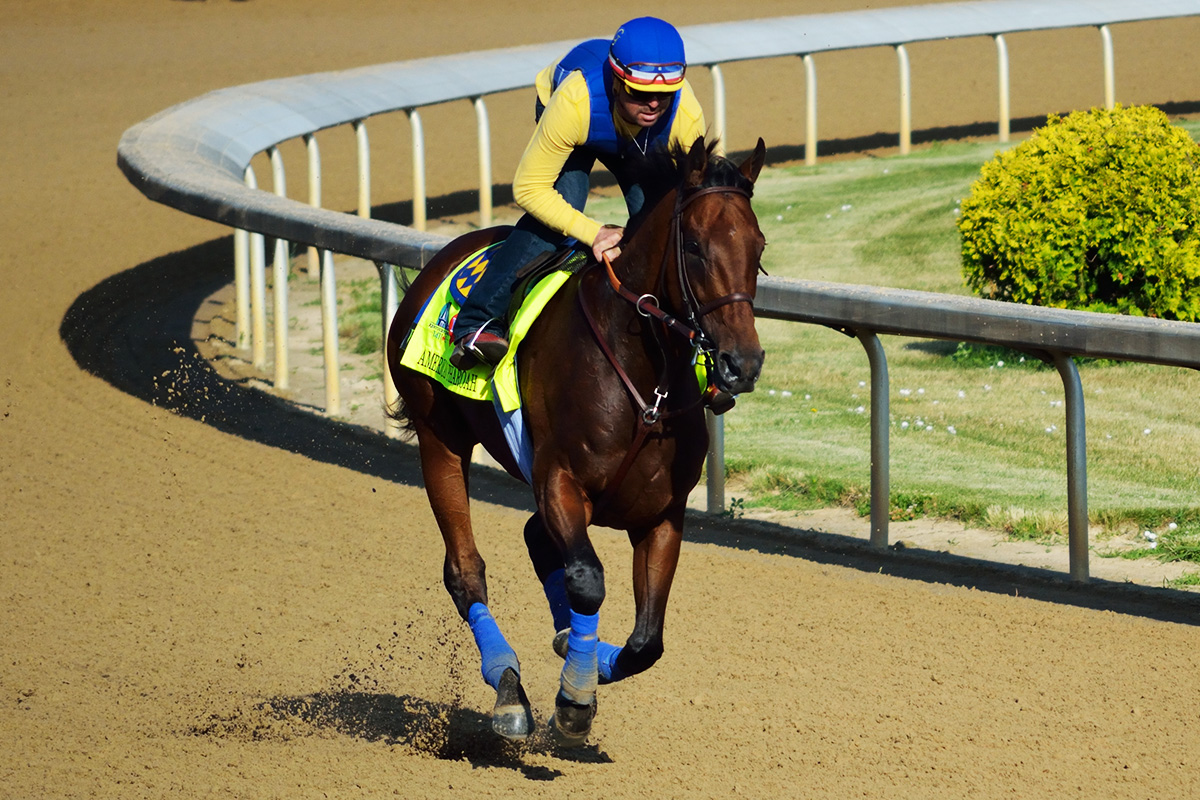
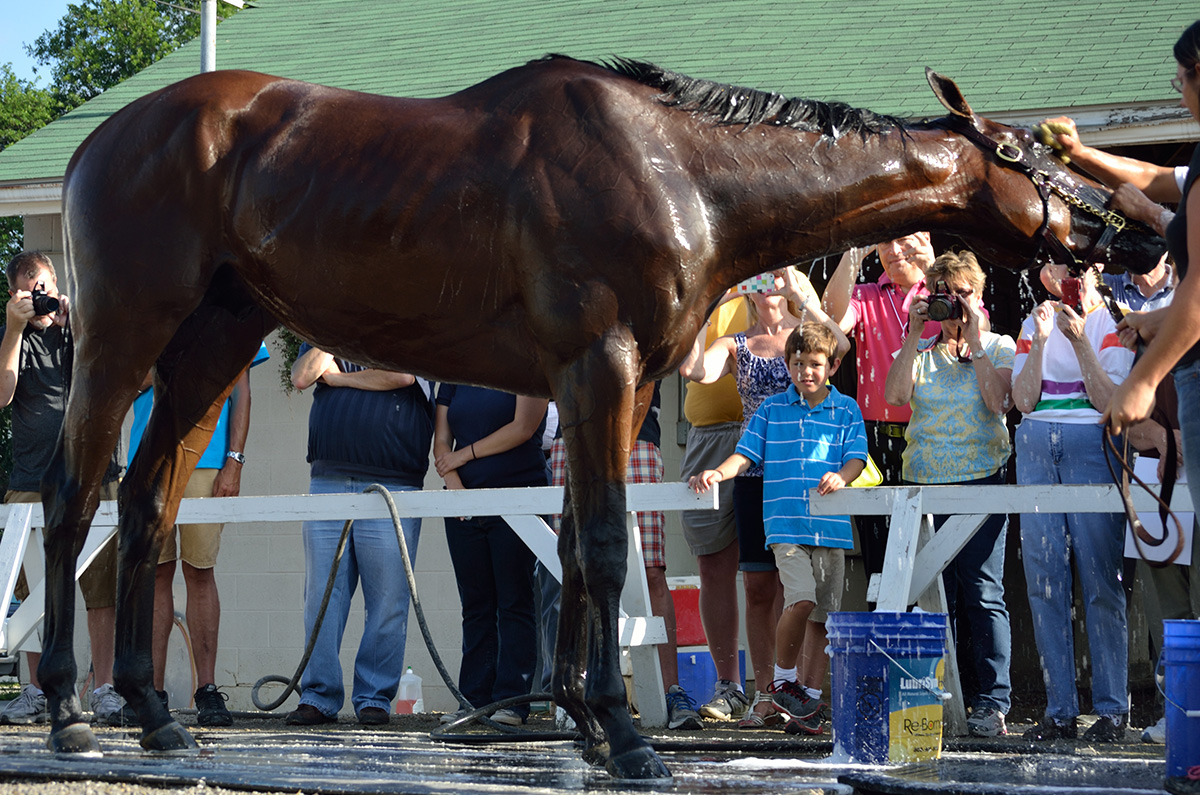
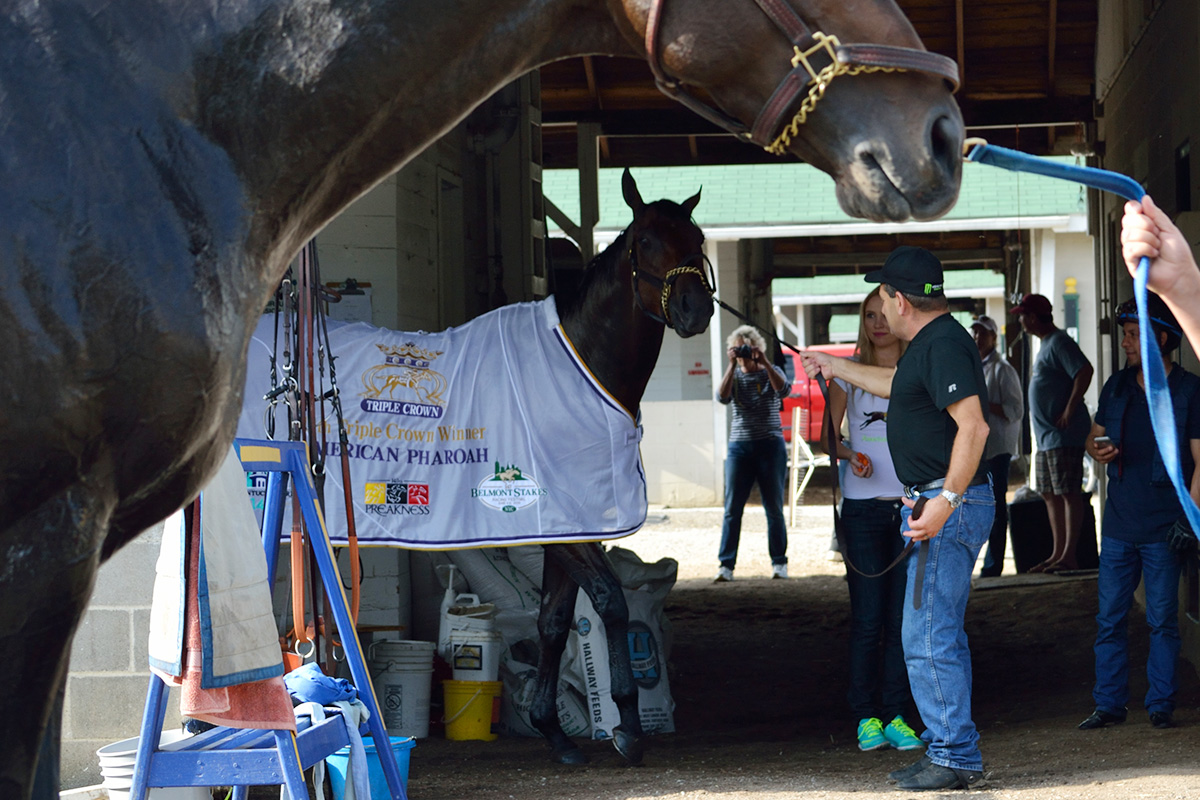
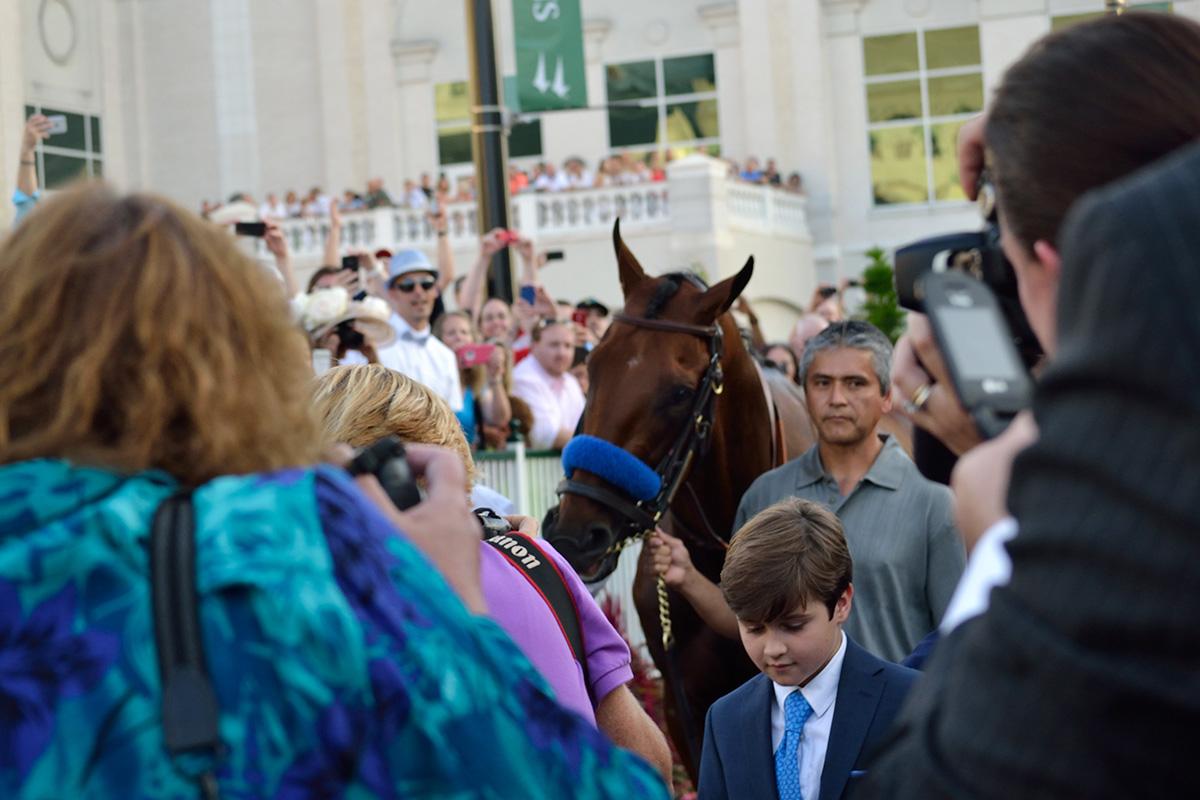
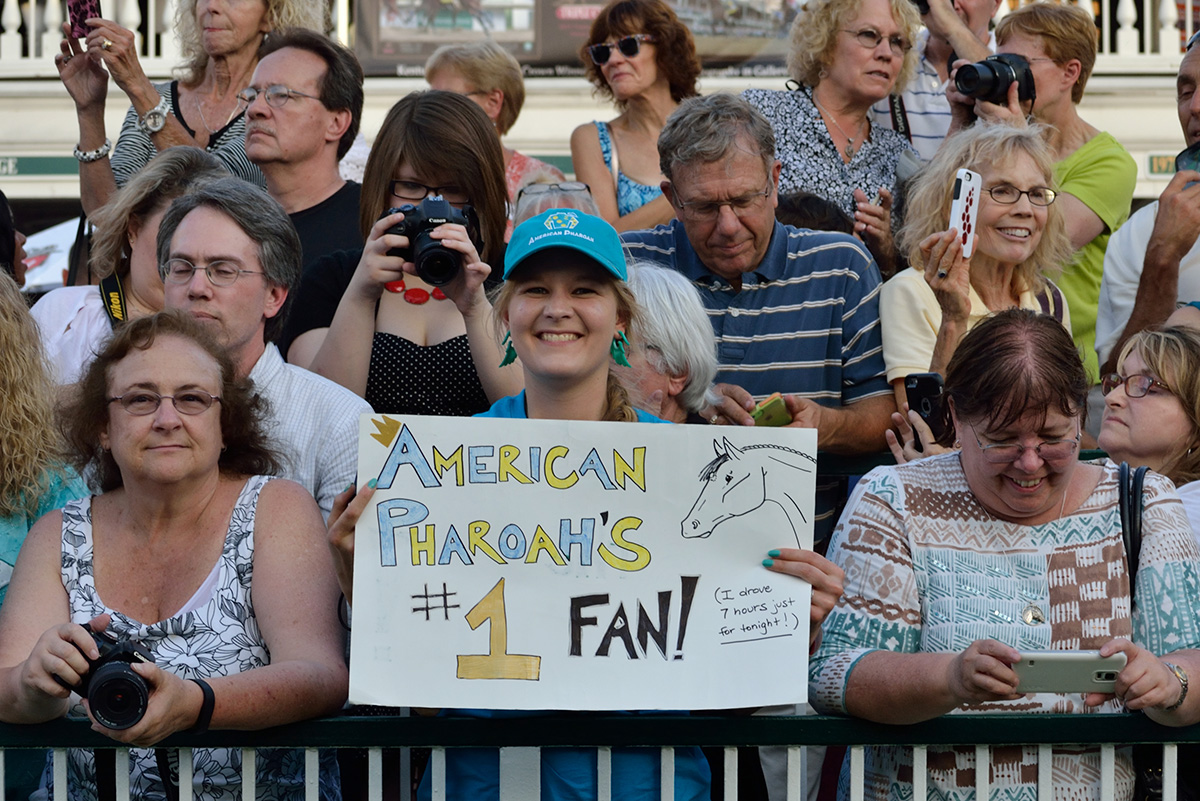
With the connections saying the Triple Crown winner will run again — so long as he’s sound, happy, and healthy — and that a start in the Breeders’ Cup Classic at Keeneland will be his career finale, tracks are bidding for an American Pharoah appearance. The Haskell at Monmouth Park seems the most likely spot for his return (the locals are asking), which leaves a late summer, early fall race open. Del Mar would like to get him for the Pacific Classic:
“If they decide the Breeders’ Cup Classic is the goal for his last race, then they’ll need some races before that,†Del Mar’s Craig Dado said. “Backing up from the BC Classic, there’s the [Awesome Again Stakes vs. older horses] at Santa Anita in September or early October. But why not the Pacific Classic…. He’s the Triple Crown winner so he doesn’t have anything to prove against 3-year-olds. Why not go against older horses and not have to ship?â€
And Parx, which drew California Chrome and Bayern for the 2014 Pennsylvania Derby, plans to be aggressive in courting Pharoah for this year’s race:
Elliott said the existing conditions of the Pennsylvania Derby are already written to pay a $100,000 appearance bonus, split between the owner and trainer, to any horse that wins any one of the Triple Crown races, the Haskell, or the Travers. The per-race bonuses are cumulative, so American Pharoah’s connections, Elliott said, could be in line for at least a $300,000 base payday just for showing up at Parx, or $400,000 if the horse wins the Haskell.
“And I believe we intend to make a little better offer than that,” Elliott said, without disclosing how much more Parx would be willing to pay above the announced bonuses. “I’m going to try in the not-too-distant future to go to wherever Mr. Baffert is and meet with him to talk about it.”
Canterbury Park is a longshot, but they’re throwing themselves into the mix:
Wednesday, the Shakopee track doubled down on its grand idea, announcing it would offer a $2 million purse for the late August race if American Pharoah shows up. And according to Halstrom, owner Ahmed Zayat and trainer Bob Baffert didn’t consider it crazy, either. Halstrom said both men told him Tuesday that they were willing to listen to offers, leading track officials to begin assembling a proposal that will convince Team Pharoah to bypass prestigious races in New York and California in favor of Minnesota.
Saratoga can’t be ruled out, for either the Jim Dandy or Travers, and New York Senator Charles Schumer is making an appeal via letter and press release:
U.S. Senator Charles E. Schumer today urged the owner and trainer of recent Triple Crown winner from the Belmont Stakes, American Pharoah, to bring their champion to the historic Saratoga Race Course this summer. Schumer urged owner Ahmad Zayat and trainer Bob Baffert, to bring the legendary colt to one of the most historic and renowned race tracks in the country.
Speaking at a press conference on Wednesday, trainer Bob Baffert told the crowd: “When he comes back, I want him to really bring his fastball … I’m not going to embarrass him because somebody made some offer or whatever.”
Mike Vaccaro on American Pharoah:
In one magical romp around the Belmont Racetrack oval, he elicited a level of fanaticism the sport hasn’t known, quite literally, in decades.
Or, since Zenyatta, in certain quarters. A corner of Twitter lit up when the weekly NTRA Thoroughbred Poll appeared Monday and American Pharoah was #1, but one vote short of unanimity. Someone had voted Shared Belief on top.
“Inane,” said a turf writer, demanding an explanation.
Shared Belief was the #1 horse last week. He’s the #2 horse this week.
The voter doesn’t need a defense. I mean, “over a weekly list? LOL.”
It’s a funny argument, except it’s also representative of an orthodox tendency within racing media, a group increasingly dominated by trade-affiliated outfits (Blood-Horse, Daily Racing Form, TVG, etc.) and freelancers, who move between journalism and public relations within the industry out of necessity. It’s a tendency that makes room for unchallenged narratives — that portray trainer Bob Baffert as transfigured by his Triple Crown horse, smoothing the complicated edges of his story; that deny criticism of marketing initiatives such as America’s Best Racing or the “Big Day” trend by dismissing the heterodox as “haters.” It makes it hard to hold a contrary opinion. Who wants to be the odd person out, especially when we share one love — the horse?
Copyright © 2000-2023 by Jessica Chapel. All rights reserved.